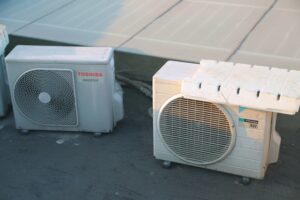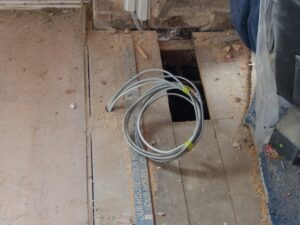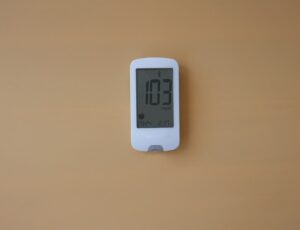Have you noticed issues with your hot water heater?
When it comes to replacing it, finding a reliable and experienced professional is crucial to ensure the job is done right.
You want someone who understands your needs and can guide you through the options available.
A functioning hot water heater is essential for your daily routine.
That’s why at Excel Mechanical, we offer top-notch HVAC and plumbing services for both residential and commercial properties.
With our commitment to exceptional quality and great value, you can trust us to help you find the best possible system to meet your individual needs and budget.
In this blog, you will learn:
- How to identify when a replacement is necessary
- Common signs that indicate a failing water heater
- Key considerations for choosing the right replacement
Let’s break it all down and explore how you can ensure you have a reliable hot water heater that meets your needs.
Identifying When a Replacement Is Needed
If you’re experiencing issues with your hot water heater, how do you know if it’s time for a replacement?
Here are some key factors to consider that can help you make that decision.
Assessing Water Heater Condition
The first step in determining whether a replacement is needed is to assess the condition of your hot water heater.
Is your unit over 10 years old?
If so, it might be time to consider a replacement since the average lifespan of a water heater is between 8 to 12 years.
Don’t forget to inspect your water heater for leaks. These can lead to significant damage in your home.
Leaks can happen for various reasons, including corrosion, damage to the tank, or a faulty valve. If you notice any leaks, it’s important to have your water heater inspected by a professional plumber.
Common Signs of Failure
So, what are the common signs that your hot water heater may be failing?
Here are a few indicators to watch for:
- Lack of hot water: If you’re not getting hot water or the water isn’t as hot as it used to be, it may be time for a replacement.
- Strange noises: Have you heard any unusual sounds coming from your water heater? These noises can be caused by sediment buildup or a faulty heating element.
- Inefficiency: If your water heater isn’t running efficiently, it can lead to higher energy bills and costly repairs down the line.
Types of Water Heaters
When it comes to replacing your hot water heater, have you considered the different types available?
Each type has its own advantages and disadvantages, so it’s important to understand the options before making a decision.
Let’s explore the most common types of water heaters, including tankless, gas, electric, and heat pump models.
Tankless Water Heaters
Tankless water heaters are gaining popularity due to their energy efficiency and space-saving design.
Instead of storing hot water in a tank, these systems heat water on demand as it flows through the unit. This means you’ll never run out of hot water during a long shower!
However, keep in mind that there may be a slight delay in getting hot water to your fixtures, which can be a consideration for larger households.
Gas Water Heaters
Gas hot water heaters are a popular choice among homeowners because of their low operating costs and fast recovery time.
They use natural gas or propane to heat water in a tank, which is then delivered to your fixtures. This option is generally less expensive to operate than electric models.
For instance, if you live in an area with lower gas prices, you might find that a gas water heater saves you money on your utility bills over time.
However, installation costs can be higher, so it’s essential to weigh these factors.
Electric Water Heaters
Electric water heaters are another common option.
They use electricity to heat water in a tank before it’s delivered to your fixtures.
While they tend to be less expensive to purchase than gas models, the operating costs can be higher, especially in areas with high electricity rates.
If your home is already equipped with electric systems, this could be a straightforward and convenient choice.
Heat Pump Water Heaters
Heat pump water heaters represent a newer technology that moves heat from the air or ground to heat water in a tank. These systems are highly energy-efficient and can save you money on your energy bills over time.
However, they can be more expensive to purchase and install compared to traditional options.
If you’re environmentally conscious, this may be a worthwhile investment, as heat pump water heaters typically have a smaller carbon footprint.
Choosing the Right Replacement
When it comes to choosing the right hot water heater replacement, are you feeling overwhelmed by the options?
It’s a big decision, and understanding what to consider can make the process much easier.
Let’s break down the key factors that will help you find the perfect replacement for your needs.
Size and Capacity
One of the most important factors to consider is size and capacity.
Have you thought about how much hot water your household uses?
A larger family with multiple bathrooms will require a bigger capacity water heater to ensure everyone has enough hot water for showers, dishes, and laundry.
If your current unit often runs out of hot water during peak usage times, it might be time to upgrade to a model with a larger tank or consider a tankless option that provides unlimited hot water on demand.
Energy Efficiency Ratings
Energy efficiency is another crucial consideration.
Choosing a more energy-efficient hot water heater can save you money on your energy bills in the long run.
Look for models with high energy efficiency ratings, such as those that are Energy Star certified.
For example, a high-efficiency gas water heater can significantly reduce your annual energy costs, giving you more budget flexibility for other household needs.
Brand and Warranty Considerations
Brand and warranty are also important.
Are you familiar with reputable brands like GE, Rheem, or State?
These companies are known for producing high-quality hot water heaters that last.
Additionally, checking the warranty offered by the manufacturer is essential. A strong warranty can give you peace of mind, knowing you’re covered in case of defects or issues with the product.
Choosing the right replacement hot water heater doesn’t have to be stressful.
With these considerations in mind, you can make an informed decision that meets your household’s hot water needs while staying within your budget.
Installation Process
So, you’ve chosen your new hot water heater—what’s next?
Understanding the installation process is essential to ensure everything goes smoothly.
Here are the main steps involved in replacing a hot water heater, along with some important safety considerations.
Removing the Old Unit
The first step in replacing your hot water heater is to remove the old unit.
You might be wondering, “Is this something I can do myself?”
While it may be tempting to tackle this as a DIY project, it’s best to hire a licensed plumber.
They know the ins and outs of the process, ensuring everything is done safely and correctly.
The plumber will start by shutting off the water supply and disconnecting the gas or electricity to the old unit.
Have you ever thought about how much water is in that tank?
After draining it, the plumber will disconnect the pipes and any gas or electrical connections before carefully removing and disposing of the old unit.
Installing the New Water Heater
Once the old unit is out, it’s time to install the new hot water heater.
The plumber will place the new unit in the same location as the old one.
Are you curious about the connections?
They’ll reconnect the pipes and any gas or electrical connections, making sure to follow all manufacturer instructions and local building codes.
After filling the tank with water, they’ll turn on the gas or electricity to the unit and check for any leaks.
This step is crucial—no one wants to deal with water damage due to a simple oversight!
Safety Considerations
Safety should always be a top priority when installing a hot water heater.
That’s why hiring a licensed plumber is key. They ensure all connections are secure and that the unit is functioning properly.
Have you ever thought about what happens if something goes wrong?
The plumber will also install a pressure relief valve to prevent the tank from over-pressurizing, which is essential for safe operation.
Related Posts:
Post-Installation Care and Maintenance
Congratulations!
You’ve just had a new hot water heater installed in your home or business.
Now, how do you ensure it continues to function properly for years to come?
Performing routine inspections and addressing minor repairs promptly can save you from bigger headaches down the road.
Routine Inspections
Regular inspections of your hot water heater are key to identifying potential issues before they escalate.
Have you ever thought about what you could do to keep your system running smoothly?
Here are a few simple things you can check:
- Check for leaks: Look for any signs of leaks around the base of the tank and in the pipes leading to and from the unit. Even a small leak can lead to significant water damage over time.
- Inspect the pressure relief valve: This valve is designed to release pressure if the tank becomes over-pressurized. Make sure it’s functioning properly and free from mineral buildup or debris.
- Examine the anode rod: The anode rod helps protect your tank from rust and corrosion by attracting corrosive elements in the water. Over time, it will deplete and need to be replaced. Have you checked it lately? Regularly inspecting the anode rod can prolong the life of your water heater.
Addressing Minor Repairs
If you notice any minor issues with your hot water heater, it’s important to address them as soon as possible.
What might seem like a small problem today could become a major headache tomorrow.
Here are a few common repairs you may need to make:
- Replacing the heating element: If your water isn’t as hot as it should be, the heating element may be worn or damaged. Replacing it promptly can restore your hot water supply without much hassle.
- Flushing the tank: Sediment and debris can build up at the bottom of the tank, affecting efficiency. Flushing the tank periodically helps keep it running smoothly. You might be surprised by how much sediment can accumulate over time!
- Repairing leaks: If you spot any leaks around the base of the tank or in the pipes, don’t wait! Addressing leaks early can prevent costly water damage and ensure your system operates efficiently.
At Excel Mechanical, we understand that your hot water heater is an integral part of your home or business. That’s why we offer top-quality water heater repair and maintenance services. With our exceptional customer service, professional expertise, and great value, we’re your best option for all your HVAC and plumbing needs.




